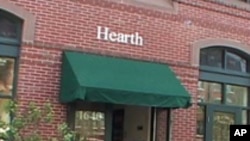<!-- IMAGE -->
Even after living in her one-bedroom apartment for nearly seven years, Estella Morris, 66, never tires of opening her front door. "I can put my key in the lock and come on in. If I want to throw my shoes underneath the bed, I throw them underneath the bed, and if I want to walk around in my underclothes I can do that," she says.
Morris cherishes her privacy and security, because she used to be homeless, and she still remembers what that was like. "You worry about where you are going to sleep, where you are going to eat, what you are going to get [for] food."
She worked hard all her life, doing laundry and caring for others as a nurse's aide, but one day found she did not have enough money to pay both the rent and put food on the table. "It don't take much to be homeless," Morris says. "Just somebody have an accident and you have to come off of your job. Whatever savings you have saved up, it don't take long before you don't have anything. And then you are homeless."
Permanent housing for the most vulnerable homeless
No longer homeless, Morris also doesn't have to worry about work. Her apartment is one of 136 managed by Hearth, a non-profit organization in Boston dedicated to finding permanent housing for the city's homeless elderly, those whom CEO Mark Hinderlie describes as "post employment."
<!-- IMAGE -->
"If you look at the proportion of people over 50 who are in the total homeless population, it's almost a third," Hinderlie says. "That is pretty consistent around the country." He estimates that Boston has about 1200 homeless elderly.
Since its founding in 1991, Hearth has provided housing for 1400 formerly homeless seniors. The non-profit organization manages seven residences. They are similar to other housing facilities in the United States which are designed specifically for the elderly. There are social activities, like monthly birthday parties and dances, meals, and support services available to residents, including a nurse and social worker on site. There is also personal care available for help with bathing and dressing.
Eighty-six percent of Hearth's residents have a disability or health concern. Hinderlie says that is often the reason they end up homeless. One client came to participate in an experimental cancer treatment at the Dana-Farber Cancer Institute. "He thought the research project would hospitalize him and it didn't. So he ended up in the shelter."
More than a home
That client was Peter Phelps, now 82. "I came to Boston with the clothes on my back," Phelps says. "Since I was going to die, I didn't need all of the clothes and the car, whatever. I gave everything away. Somebody could use it, I passed it on."
Phelps credits his doctor with curing his lung cancer, but he credits Hearth with giving him back his life, by letting him return to his passion, making art. Two years ago the organization found him an apartment he could afford, and once he moved in, he turned the living area into a studio.
Phelps spends 40 hours a week drawing and painting, but hasn't made a penny from his work. "I have not sold a painting since I came to Boston. I give everything away," Phelps says. He gave some to neighbors who live in his apartment building. But more than 100 have been donated to Hearth to raise funds for the organization so others, like him, will get a permanent home.






